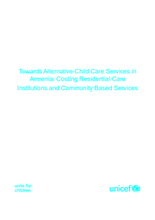This recent study by UNICEF in Armenia costed different types of residential care and community based services in order to forecast the financial implication of the Government of Armenia’s reform policies which emphasize deinstitutionalization and transition to community based forms of care. The study shows that the reallocation of children into family care does not necessarily lead to the creation of an additional burden on the state budget. On the contrary, depending on the policy chosen, the savings can be quite tangible, even if the reform costs include the provision of jobs to excessive staff of the discharged residential institutions and additional social support and care services for children released from residential institutions and their families.
The policy provisions articulated by the Government of Armenia imply a reform, not only of the administrative structures involved in the protection of children, but also of the services provided to children at risk. In this regard, an important achievement in the reform of child protection services is the deinstitutionalization of residential care institutions, which has led to the restructuring of 17 boarding schools in 2007 and the reintegration of approximately 4,000 boarding school students into their biological families. While this is a good start, there still exist a number of child care institutions in the country which are managed by the Ministry of Education and Science, Ministry of Health, Ministry of Labor and Social Affairs and local authorities.

